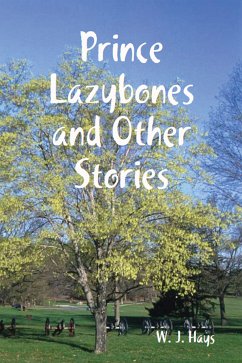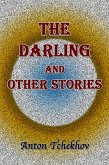Of all the illustrious families who have shone like gems upon the earth's surface, none have been more distinguished in their way than the Lazybones family; and were I so disposed I might recount their virtues and trace their talents from a long-forgotten period. But interesting as the study might prove, it would be a difficult task, and the attention I crave for Prince Leo would be spent on his ancestors.
Of princely blood and proud birth, Leo was a youth most simple-minded. He knew that much was expected of him, and that he was destined to rule; yet so easily was he satisfied that his greatest happiness was to lie all day basking in the sun or dawdling through his father's park with his dog at his heels, the heels themselves in a very down-trodden state of humility, watching with languid gaze the movements of the world about him.
And the world just where he lived was very beautiful. On a fertile plain, surrounded by mountain-peaks of great height, threaded by silver streams, and so well watered that its vegetation was almost tropical, was the estate of Leo's father, Prince Morpheus Lazybones. It had been in the family for ages, and was so rich in timber and mineral resources that none of its owners had cared to cultivate the land. Timber was cut sparingly, however, because the market for it was too distant, and the minerals remained in their native beds for much the same reason.
The family throve, notwithstanding, and were well supplied with all manner of delicacies, for the servants were many, and there was never a lack of corn or wine.
Leo was most fair to see. To be sure, his drooping lids half concealed his azure eyes, and his golden locks sometimes hid his snowy forehead; but his smile was charming; his face had such an expression of calm satisfaction, such a patient tranquillity, that his smile was as the sudden sunshine on a placid lake. It was the smile of the family, an inherited feature, like the blue hood of a Spanish Don. And then it was given so freely: the beggar would have preferred it to be accompanied with the jingle of a coin, but as the coin never came and the smile did, he tried to think that it warmed his heart, though his wallet went empty.
There were those who said a smile cost nothing, else it would not have been bestowed. It had a peculiarity of its own which these same critics also objected to-it nearly always ended in a yawn.
But Leo heard none of these ill-natured remarks, and, if he had, would not have minded them any more than he did the burs which clung to his garments as he rambled through the woods. Poor fellow! he would gladly have shared his coppers with a beggar, but he had none to share.
Morpheus Lazybones never seemed to think his son required anything; so long as the boy made no demands, surely nothing could be wanting, and every one knew he was not equal to any exertion. For years he had lived the life of an invalid, shut up in his room most of the time, venturing from it only in the sunniest weather, and then with great caution. He had no particular malady except that he was a poet, but surely that was burden enough. To have to endure the common sights and sounds of this earth when one is composing poetry is indeed a trying and troublesome thing. So Morpheus found it, and therefore he frequently stayed in bed, and allowed his fancy to rove at its own sweet will.
Of princely blood and proud birth, Leo was a youth most simple-minded. He knew that much was expected of him, and that he was destined to rule; yet so easily was he satisfied that his greatest happiness was to lie all day basking in the sun or dawdling through his father's park with his dog at his heels, the heels themselves in a very down-trodden state of humility, watching with languid gaze the movements of the world about him.
And the world just where he lived was very beautiful. On a fertile plain, surrounded by mountain-peaks of great height, threaded by silver streams, and so well watered that its vegetation was almost tropical, was the estate of Leo's father, Prince Morpheus Lazybones. It had been in the family for ages, and was so rich in timber and mineral resources that none of its owners had cared to cultivate the land. Timber was cut sparingly, however, because the market for it was too distant, and the minerals remained in their native beds for much the same reason.
The family throve, notwithstanding, and were well supplied with all manner of delicacies, for the servants were many, and there was never a lack of corn or wine.
Leo was most fair to see. To be sure, his drooping lids half concealed his azure eyes, and his golden locks sometimes hid his snowy forehead; but his smile was charming; his face had such an expression of calm satisfaction, such a patient tranquillity, that his smile was as the sudden sunshine on a placid lake. It was the smile of the family, an inherited feature, like the blue hood of a Spanish Don. And then it was given so freely: the beggar would have preferred it to be accompanied with the jingle of a coin, but as the coin never came and the smile did, he tried to think that it warmed his heart, though his wallet went empty.
There were those who said a smile cost nothing, else it would not have been bestowed. It had a peculiarity of its own which these same critics also objected to-it nearly always ended in a yawn.
But Leo heard none of these ill-natured remarks, and, if he had, would not have minded them any more than he did the burs which clung to his garments as he rambled through the woods. Poor fellow! he would gladly have shared his coppers with a beggar, but he had none to share.
Morpheus Lazybones never seemed to think his son required anything; so long as the boy made no demands, surely nothing could be wanting, and every one knew he was not equal to any exertion. For years he had lived the life of an invalid, shut up in his room most of the time, venturing from it only in the sunniest weather, and then with great caution. He had no particular malady except that he was a poet, but surely that was burden enough. To have to endure the common sights and sounds of this earth when one is composing poetry is indeed a trying and troublesome thing. So Morpheus found it, and therefore he frequently stayed in bed, and allowed his fancy to rove at its own sweet will.
Dieser Download kann aus rechtlichen Gründen nur mit Rechnungsadresse in A, B, BG, CY, CZ, D, DK, EW, E, FIN, F, GR, H, IRL, I, LT, L, LR, M, NL, PL, P, R, S, SLO, SK ausgeliefert werden.









